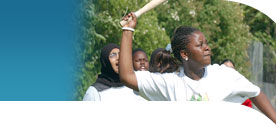



The PE programme of study provides a context for developing pupils' personal, learning and thinking skills (PLTS).
The key process of learning how to be successful in different competitive, creative and challenge type activities and situations requires pupils to plan what they are going to do and how to go about doing it as an individual or as part of a team or group. Pupils need to make informed and reasoned decisions that, when applied and carried out, will contribute to the success of a performance while taking account of their responsibility to themselves and others.
PE requires individuals, groups and teams to use their imagination to arrive at their own solutions to performing tasks and activities. They need to come up with their own ideas, selecting and applying the most appropriate in order to be effective and successful. Often the more creative and innovative the skills, techniques and tactics applied, the greater the success of the performance. In most activities, the need to respond to what is happening around them requires a degree of creative improvisation.
The key process of using tactics, strategies and compositional ideas often requires pupils to work with others to plan and perform creative, competitive and challenging activities. To be effective and successful when working together, pupils need to learn to take account of each other's strengths and weaknesses and to take responsibility for the part they play in the team's performance. Pupils learn to listen to and act on each other's suggestions, reach agreement on ways forward and take collective responsibility for their performances, successes and failures.
PE fosters independence by encouraging pupils to take responsibility for their physical well-being and to select which activities they enjoy and wish to get involved in. They then can begin to make informed choices about how physical activity will play a part in their daily lives both in and out of school.
Pupils increasingly set goals and challenges for themselves. They take the initiative to organise and manage all aspects of an activity, including determining priorities, managing risks and working safely to achieve their goal.
Becoming competent in PE naturally requires the active participation and engagement of pupils. The programme of study allows them to choose the activities they get involved in. The competence and confidence pupils develop can help them to play a full part in the sporting life of the school and to engage in their chosen activities in the wider community. Pupils also have the opportunity to listen to others and to share and discuss their work. They learn how to provide constructive feedback and realise how their contributions can play a part in the success of others.
In order to improve, pupils need to be able to evaluate their performance and that of others. In PE, pupils learn to ask themselves a range of questions when analysing a performance, to evaluate strengths and weaknesses and identify and find ways of refining the quality of a performance. These are ongoing processes which underpin learning, improvement and success in physical activity.
With thoughtful planning, a range of PLTS can be embedded in any sequence of work. For example, pupils might be asked to work with others to produce a sequence of six to eight actions (from scheme of work unit 16: Gymnastics activities: development). This would involve pupils: